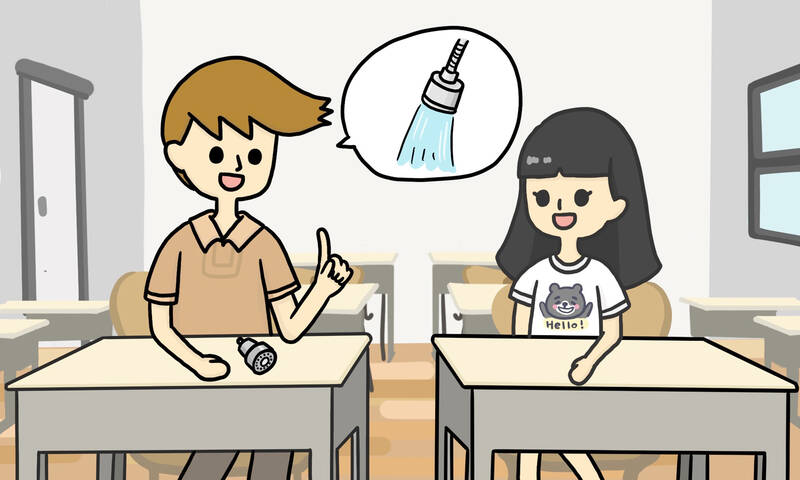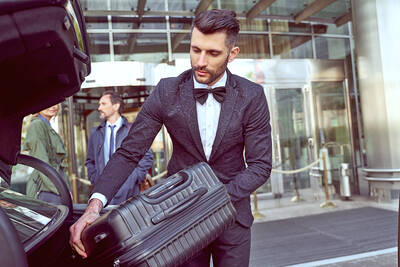對話 Dialogue
小實:馬克,你桌上那個是省水的「起泡器」嗎?
Xiǎoshí: Mǎkè, nǐ zhuō shàng nàge shì shěngshuǐ de “qǐpàoqì” ma?

馬克:嗯,這是我要回家裝在水龍頭上的。
Mǎkè: En, zhè shì wǒ yào huíjiā zhuāng zài shuǐlóngtóu shàng de.
小實:哇!我也想買這個,可是不知道有沒有效。
Xiǎoshí: Wa! Wǒ yě xiǎng mǎi zhège, kěshì bù zhīdào yǒu méiyǒuxiào.
馬克:我也是第一次買這個,希望可以省一點水。
Mǎkè: Wǒ yěshì dì yī cì mǎi zhège, xīwàng kěyǐ shěng yìdiǎn shuǐ.
小實:好,我也趕快去買一個來裝,一起珍惜水資源。
Xiǎoshí: Hǎo, wǒ yě gǎnkuài qù mǎi yíge lái zhuāng, yìqǐ zhēnxí shuǐzīyuán.
馬克:其實省水還有很多方法,像是多淋浴、不泡澡。
Mǎkè: Qíshí shěngshuǐ háiyǒu hěnduō fāngfǎ, xiàngshì duō línyù, búpàozǎo.
小實:我們家沒有浴缸,所以我只能淋浴。
Xiǎoshí: Wǒmen jiā méiyǒu yùgāng, suǒyǐ wǒ zhǐ néng línyù.
馬克:還有重複用水,像是我用除濕機的水來沖馬桶。
Mǎkè: Háiyǒu chóngfù yòngshuǐ, xiàngshì wǒ yòng chúshījī de shuǐlái chōng mǎtǒng.
小實:哇!你真的很珍惜水資源,我要向你看齊。
Xiǎoshí: Wa! Nǐ zhēnde hěn zhēnxí shuǐ zīyuán, wǒ yào xiàng nǐ kànqí.
翻譯 Translation
Xiaoshi: Mark, is that a water-saving “bubbler” on your desk?
Mark: Yes, I’m going to put it on the faucet once I get home.
Xiaoshi: Wow! I want to buy this too, but I don’t know if it will work.
Mark: I’m also using this for the first time, hoping to save water.
Xiaoshi: Well, I should buy one as soon as possible so we can cherish water resources together.
Mark: In fact, there are many ways to save water, such as taking showers more, instead of taking baths.
Xiaoshi: We don’t have a bathtub at home, so I can only take a shower.
Mark: Also, I use the water from the dehumidifier to flush the toilet.
Xiaoshi: Wow! You really do cherish water resources. I’m impressed.
單字片語 Vocabulary
1. 省(水)shěng (shuǐ) to save (water)
2. 起泡器 qǐpàoqì bubbler
3. 水龍頭 shuǐlóngtóu faucet
4. 珍惜 zhēnxí to cherish
5. 水資源 shuǐ zīyuán water resources
6. 淋浴 línyù take a shower
7. 泡澡 pàozǎo take a bath
8. 浴缸 yùgāng bathtub
9. 重複 chóngfù re-, repeatedly
10. 沖馬桶 chōng mǎtǒng to flush the toilet
教材音檔 Audio Files
教材影片 Video Files:
https://www.instagram.com/celc.nou_tw/guide/_/17999106352646292/
實踐大學華語中心提供
By Shih Chien University Chinese Language Center: https://chineseusc.com/

★ Bilingual Story is a fictionalized account. 雙語故事部分內容純屬虛構。 “Any New Year’s resolutions?” he asked. Lena put her coffee down. “Yeah,” she said. “To get in shape.... round is a shape, right?” Mark chuckled. “I support this. Fully achievable. Low risk.” “Thanks,” she smiled and lovingly rubbed her round belly. “I like a resolution I can’t fail.” “Funny thing is, I was thinking about getting round too.” Lena nodded her head in approval, “You could put some meat on those skinny bones of yours.” Mark shook his head, “Not that kind of round. Wheel-of-Life round.” She raised an eyebrow.

詞法—不定詞的誤用 1. 我得記住星期五要把報告寫好。 ˇ I must remember to finish my report by Friday. χ I must remember finishing my report by Friday. 註︰remember 後面跟動名詞或不定詞表示兩種不同的概念,與 forget 相類似。 試比較下列句子: I remember meeting him somewhere.(我記得曾經在某處見過他。) I must remember to meet him at the station at six this evening. (我必須記住今晚六點得去車站接他。) He remembered turning off the light when he left the room. (他記得離開房間時曾先把燈熄了。) Remember to turn off the light when you leave the room. (記住離開房間時要把燈關了。) 2. 他提醒她做好她份內的事。 ˇ He reminded her to do her job. χ He reminded her of doing her job. 註︰remind ... of ... 後面跟動名詞,表示「使人想起做過某事」。若是「提醒某人應做某事」,應用 remind ... to do ...。試比較下列句子: He reminded me of my attending the lecture last Friday. (他讓我想起我上星期五去聽過那次演講。) He

對話 Dialogue 清清:最近天氣越來越冷,感覺很容易感冒,要不要一起去吃薑母鴨或是羊肉爐? Qīngqing: Zuìjìn tiānqì yuèláiyuè lěng, gǎnjué hěn róngyì gǎnmào, yào bú yào yìqǐ qù chī jiāngmǔyā huòshì yángròulú? 華華:最近我覺得有點累,想吃薑母鴨,可是又怕一下子吃太補會上火。 Huáhua: Zuìjìn wǒ juéde yǒudiǎn lèi, xiǎng chī jiāngmǔyā, kěshì yòu pà yíxiàzi chī tài bǔ huì shànghuǒ. 清清:那我們去喝香菇雞湯吧,不太容易上火,喝了也會很暖和。 Qīngqing: Nà wǒmen qù hē xiānggū jītāng ba, bú tài róngyì shànghuǒ, hē le yě huì hěn nuǎnhuo. 華華:聽起來不錯!你們家平常冬天都吃什麼進補? Huáhua: Tīng qǐlái búcuò! Nǐmen jiā píngcháng dōngtiān dōu chī shénme jìnbǔ? 清清:我家都煮麻油雞,吃完整個人手腳都會熱起來。我也很久沒喝香菇雞湯了,正好可以去打打牙祭。 Qīngqing: Wǒ jiā dōu zhǔ máyóujī, chī wán zhěnggè rén shǒujiǎo dōu huì rè qǐlái. Wǒ yě hěn jiǔ méi hē xiānggū jītāng le, zhènghǎo kěyǐ qù dǎ dǎ yájì. 華華:可是我最近在減肥,會不會吃得太補,肉又長回來了? Huáhua: Kěshì wǒ zuìjìn zài jiǎnféi, huì bú

A: Apart from Taiwan’s A-mei, Mayday and Jolin Tsai, there are many foreign singers coming to Taiwan early this year. B: The South Korean girl group Babymonster are playing two shows at Taipei Arena starting from tonight. Who else is coming to Taiwan? A: Other artists include Australian band Air Supply, K-pop superstar Rain, boy group Super Junior, TXT, US singers Giveon and Josh Groban, and Irish boy group Westlife. B: Air Supply was the first foreign band to come to Taiwan in 1983, and they’re probably the most frequently visiting group too. A: As the year is beginning